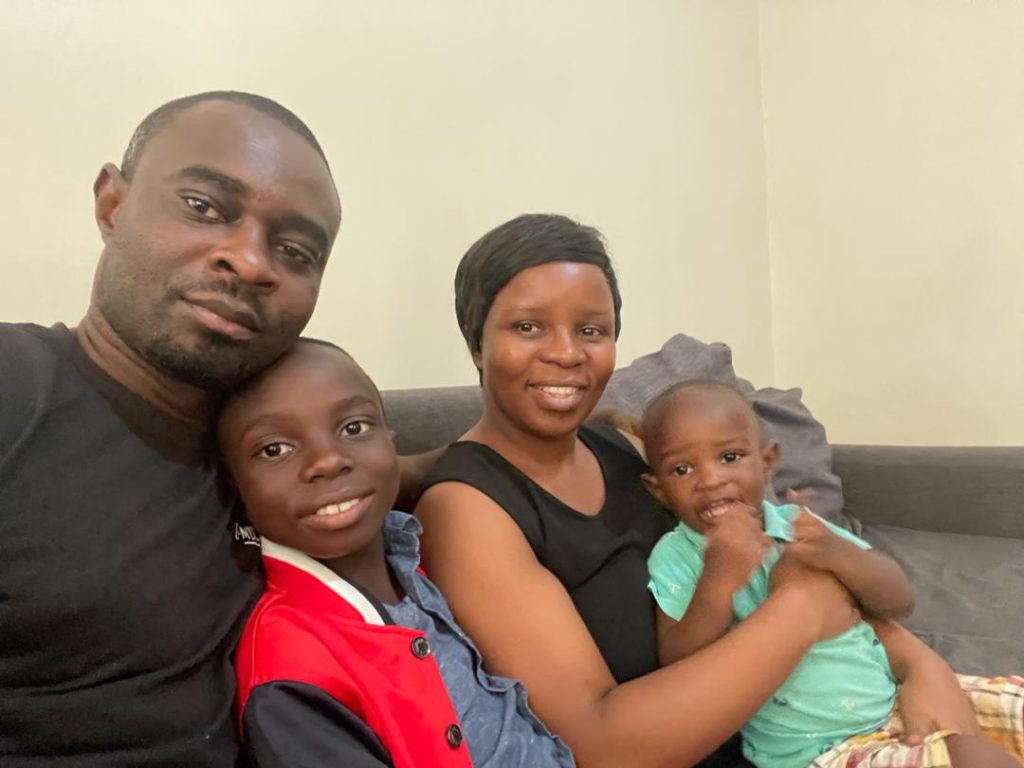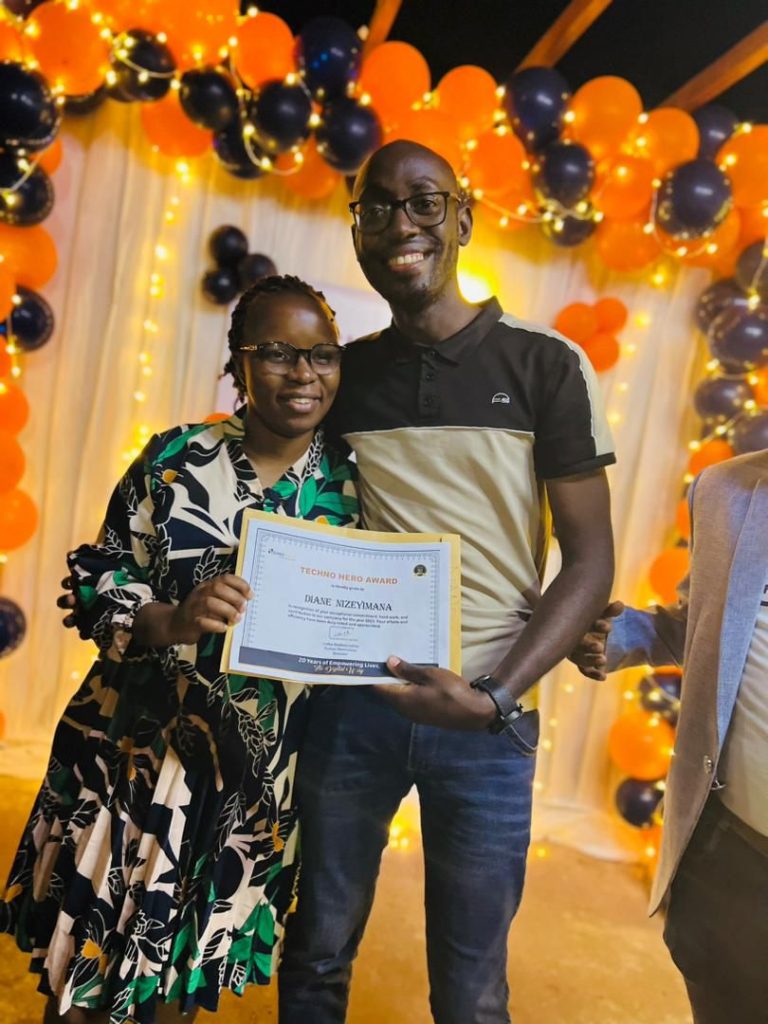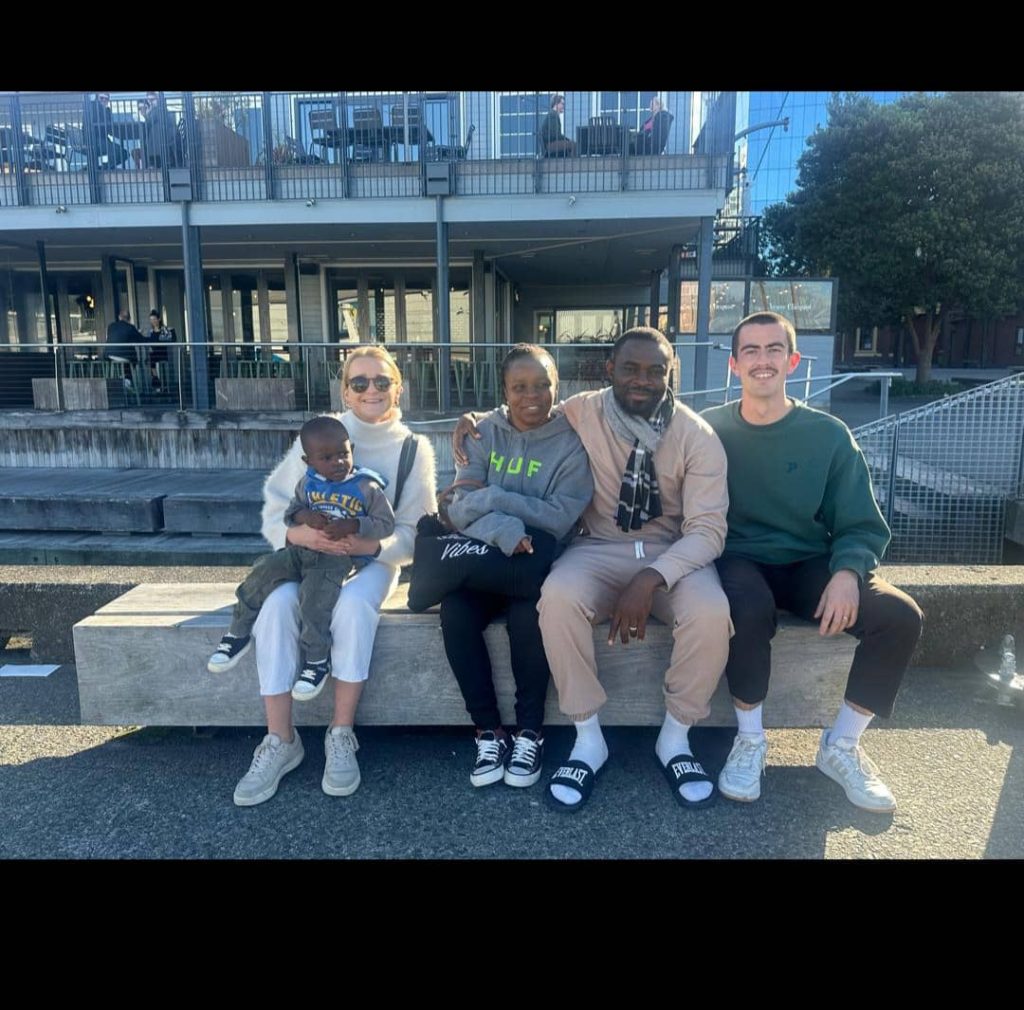Refugee couple work their way from Congo to New Zealand through FCA and UNHCR complementary pathways programme

Erick and Diane fled DRC for Uganda when faced with ethnic persecution. Starting with selling street food, the couple worked tirelessly for nearly ten years in different jobs before applying for a UNHCR programme with FCA help that saw them move to New Zealand.
Text: Kadlah Nabakembo
Photos shared by: Erick Mokuma Mombole
‘Leaving Congo was not a choice, it was a necessity’
Erick Mokuma Mombole is a Congolese national born in Kinshasa, Democratic Republic of the Congo. Conflict stemming from tribal and religious divisions forced him to seek refuge and rebuild his life with his wife Diane.
The move was significant because Erick, who is from an ethnic minority from the west, married Diane, from the east while living there. The M23 rebel movement‘s rise created tensions and suspicion towards Erick, an “outsider” in the region. Their inter-ethnic marriage and Erick’s presence in the east were likely seen as a threat, leading to mistreatment and forcing them to flee.
Diane has a Bachelor of Science degree in Medical Pharmacy and Erick has a degree in Information Technology. One Sunday afternoon, Erick came home asked Diane to get her academic documents as he also put together his. And just like that, under a grey sky, they took their last walk through their village, leaving everything behind. “Leaving Congo was not a choice, it was a necessity,” Erick says.
Their escape led them to Kisoro, Uganda, where they boarded an old truck, its cargo hold filled with cattle. Erick and Diane traversed bumpy roads, wondering how, when and if they would make it across the border. “It was the longest journey of my life,” Erick recalls, highlighting the physical and emotional pain.
Arrival in Uganda
At the Kampala police station, Erick and Diane found themselves waiting for an entire day and night. Directed to the office of the prime minister, they registered as refugees pending approval and were soon guided to the Jesuit Refugee Services in Nsambya. As they arrived, the staff quickly noticed that Diane was pregnant and arranged for her to receive care at the city hospital in the Kisenyi neighbourhood.
Their next task was to find a place to stay. Despite the challenges, a kind-hearted gentleman from the police helped them secure a one-room accommodation in the Bakuli neighbourhood in Kampala, at a cost of 70,000 Uganda shillings (approximately 18 US dollars).
It wasn’t luxurious, but they were grateful just to have a roof over their heads. The room proved to be a mixed blessing—too cold at night and unbearably hot during the day. Jesuit Refugee Services met their immediate needs. They received support for a month, along with basic necessities and a sum of 100,000 shillings (approximately 26 US dollars) for their upkeep for three months.
Settling into life in Bakuli, Erick and Diane found relief in the kindness of their neighbors. Despite their own challenges, the neighbors allowed Erick and Diane to wash their clothes at theirs for a small fee. With determination, they managed to save up some money and invested in a small waffle machine to make pancakes. They sold their waffles to the people who had helped them: the Jesuit Refugee Services; the Uganda Police in Old Kampala; and the Office of the Prime Minister, because those were the only places known to them.
The couple welcome a baby
In May 2014, Erick and Diane welcomed their son, Tylor. Despite the good news, challenges continued. Erick found himself working tirelessly to sustain their family making and selling pancakes and waffles to make ends meet. “These were hard times,” Erick recalls, “but something inside me kept me going. I knew and believed that in the end, it would be well.” In that small room, Erick and Diane felt safe. They didn’t have much, just a few things, but they held onto each other and stayed strong. Even when things were hard, their love kept them going, like a light in the dark. “Diane almost gave up, but I had a driving force pushing me to continue working,” Erick recalled.
During Erick’s days of selling waffles, a customer noticed his determination and inquired about his education. When Erick mentioned his bachelor’s degree in computer and management, the customer introduced him to a company in downtown Kampala, who were willing to give him a chance based on his computer knowledge. With no desk to call his own, Erick found himself working outside the shop, running errands and helping out wherever he could. At the end of each day, they would compensate him with 20,000 shillings (approximately 5 dollars). After four months of hard work, Erick and Diane decided to invest their savings in an HP laptop. With this new tool, Erick committed himself into learning graphics, web design, and editing for his colleagues, all without any cost.
“It was tough at first, but I knew I had to keep pushing forward,” Erick recalls, reflecting on those early days.
A chance for Diane
Through dedication and practice, Erick quickly mastered his skills and began attracting his own clients. Soon enough, he joined forces with three others to open a shop, sharing the rental costs. They split the monthly fee of 350,000 shillings (approximately 92 dollars) amongst them. The new entrepreneurial endeavour also reaped benefits for Erick’s wife.
“While at work, I made numerous connections, one of which led to a significant opportunity for Diane,” Erick recounts, a sense of pride evident in his voice.
A friend of Erick was seeking a multilingual translator for Techno Brain, a global digital consultancy. With Diane’s proficiency in English, French, and Swahili, Erick made the connection, securing her a daily pay totaling 500,000 shillings per month (approximately 132 US dollars).

“With Diane’s skills, I knew she would excel in this role,” Erick reflects, recalling his confidence in his wife’s abilities.
With Diane and Erick both employed, they decided to move to a one-bedroom house in Namungoona, paying a monthly rent of 150,000 (approximately 40 dollars) shillings. Despite the challenges, Diane persevered, even when faced with ridicule from her coworkers for her English skills. Although she was fluent in English, her strong accent sounded different and was mocked. Erick stood by her side, encouraging her to keep learning and improving, and his support helped her to stay motivated and confident. Diane kept learning and in a few years had seven different language under her belt.
“It wasn’t easy, but we knew we had to keep moving forward,” Erick shares, his voice filled with determination.
UNHCR programme
A special moment arrived when Techno Brain introduced a refugee helpline in partnership with UNHCR. The organization offered Diane a contract for a new role that required fluency in English, Kinyarwanda, French, and Lingaala. As chance would have it, Diane was the only candidate at Techno Brain who possessed this unique combination of language skills, making her ideal for the position.
As Erick and Diane established their new life in Namungoona, a quiet suburb far from the city’s hustle and bustle, they found comfort in the warmth of their humble home. Though distance separated them from their loved ones, they persevered, with only Diane’s sister nearby to share in their joys and sorrows. “We longed to share our happiness with our families, but they were far away,” Erick said wistfully. “Our families were divided by cultural and religious differences, which only served to widen the gap between us,” Erick reflected with sadness.
Their son, Tylor, began attending school in Namungoona, marking a new chapter in their lives and in 2018, they managed to secure a two-bedroom apartment, a significant step up from their previous accommodation.
Financial challenges met with kindness
Erick’s business endeavors had starting bringing in substantial profits. With money in his pocket, his dream of buying a car was fulfil. “It was not safe for us on boda boda (motorcycle taxis commonly found in East Africa),” Erick recounted. “The costs and risks were too high due to reckless drivers and many other issues.” But just four weeks into buying the car, COVID-19 pandemic abruptly halted their plans for further investment. A car purchase, once seen as a symbol of success, became a burden as lockdown restrictions rendered it immobile.
While the entire world was on a lockdown, the couple experienced financial challenges, their landlord at home displayed compassion by reducing their rent, alleviating some of their financial strain. “Oh God bless her,” Erick expressed gratitude. “She reduced the cost of my rent from 500,000 to 200,000 monthly so that I could afford it.”
After enduring several miscarriages, Erick’s wife, Diane, finally welcomed another baby into their family, bringing them joy as a family of four. The journey to get there was long and difficult, with each miscarriage requiring costly visits to specialists to identify the underlying causes, further straining their finances. The struggle to conceive again was equally challenging, with numerous doctor’s visits and expensive treatments. Recalling the compassion of their landlord during those difficult times, Erick reflected on the financial strain caused by the loss of pregnancies, which had even led to the loss of his business.
Forced to start afresh, he returned to his roots, where supportive friends welcomed him back with open arms. Despite the hardships, the arrival of their new baby brought them immense joy and a sense of redemption, making their journey worthwhile.
The struggles persisted as Erick was forced to sell his beloved car at a significant loss. He used the proceeds to pay off debts and cover essential expenses, helping them stay afloat during a difficult period. In 2018, they discovered the Complementary Pathways Labour Mobility programme, which offered a glimmer of hope. They independently applied for the programme, facilitated by FCA, which provided invaluable training and support, including CV writing skills, to enhance their employability and potentially secure a brighter future.
Move to New Zealand
In June 2023, Erick received a call from UNHCR, revealing an exciting opportunity to relocate to New Zealand. Upon sharing the news with his wife, they both celebrated their luck in being selected for the same programme.
The family’s journey saw further upgrades when they were selected for a labor mobility program in New Zealand. This opportunity marked a new chapter, promising a fresh start with government support, furnished accommodation, and educational opportunities. It was a dream come true, especially after enduring numerous hardships, including financial struggles and personal losses.
FCA Uganda had the fortunate opportunity to meet a hopeful and enthusiastic Erick, along with his son Tylor, just a few days before they were set to leave for New Zealand. Erick was filled with hope and eagerly anticipated starting anew with his family in New Zealand, where they have since settled and found satisfaction.
“Our journey from Congo to Uganda and now to New Zealand could never be better. A private sponsor from the Anglican Church, along with the UNHCR and Finn Church Aid, all played a crucial role in our journey.”
Finn Church Aid played a critical initial role by identifying qualified candidates and referring them based on New Zealand’s criteria.
UNHCR took on a collaborative and strategic role by advocating for these candidates, conducting verification and carrying out the vetting processes, it also analyzed the family composition to ensure they met the necessary criteria. They collaborated with the International Organization for Migration (IOM) to manage pre-departure formalities and support the candidates.
The private sponsors contributed by providing opportunities that will allow candidates make professional contributions to the host country and engage in meaningful work which help expand the tax base. Together, these three main players significantly contributed to enabling Erick and Diane, refugees with potential to secure employment and transform their futures.
